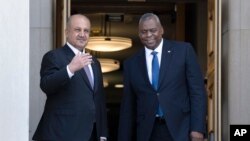The United States and Iraq are hoping to take critical steps to expand their partnership from one focused almost entirely on countering the Islamic State (IS) militant group to one some U.S. officials describe as a 360-degree whole-of-government alliance.
Defense officials and diplomats from both countries met at the Pentagon Monday for the start of two days of talks that include a meeting between U.S. Defense Secretary Lloyd Austin and Iraqi Minister of Defense Thabit Muhammad al-Abbasi.
"We recognize … our military mission will change as your forces build up their capabilities," Austin told Abbasi, describing the talks as part of the "next step in our strategic defense partnership."
Speaking through a translator, Abbasi said that while it was crucial to "maintain the victories" Iraqi and U.S. forces had already secured, "[it is] most important now to enhance the relationships and the cooperation between us and the United States moving forward."
"We are very encouraged we are not going to leave Washington without success," he added.
The U.S. has about 2,500 troops in Iraq tasked with advising and assisting Iraqi security forces as they pursue the remnants of the Islamic State group, also known as ISIS or Daesh.
Getting results
U.S. officials say the arrangement, with Iraqi forces in the lead since December 2021, has proven successful. U.S. estimates show IS ranks have been cut to fewer than 1,000 fighters in Iraq while the group's leadership in Iraq has likewise been continually degraded by Iraqi forces.
The payoff has been a 64% reduction in IS attacks in Iraq so far this year, U.S. officials say. And the attacks that have taken place have been less deadly.
"I think it's fair to say decades into the future, U.S. forces will not be present in Iraq in the current formation that we are today," said Dana Stroul, deputy assistant secretary of defense for the Middle East, speaking to reporters prior to Monday's talks.
Exactly what the U.S. presence in Iraq might look like has yet to be determined. But the sustained success against IS is paving the way for discussions that could see Washington's relationship with Iraq begin to look more like other U.S. partnerships in the region.
"We are interested in an enduring defense relationship within a strategic partnership … not just a military, not just defense relationship," Stroul said. "We see a whole-of-government strategic partnership for many, many years to come."
U.S. State Department officials say that includes focusing more on the Iraqi economy, noting that some U.S. businesses such as Cinnabon and Burger King have already opened stores in Baghdad.
"That is [a] very strong symbol and signal that they [the Iraqis] want American products and they want American businesses, even if they are franchises," said a State Department official, briefing reporters on the condition of anonymity.
"We would like to continue to expand our engagement on energy, particularly on helping the Iraqis build their greater self-sufficiency in their energy sector," the official added, emphasizing there is a focus on finding ways "to keep young Iraqis employed."
U.S. officials say they have also been encouraged by Iraq's progress in fighting corruption, noting improvements especially in the banking sector, though Washington's decision to blacklist 14 Iraqi banks for alleged money laundering on behalf of Iran sparked protests last month.
Still, the heavy focus is likely to remain on defense cooperation given the ongoing, if somewhat minimized, threat from IS.
"I still believe the reemergence of ISIS is a, is a considerable risk," said Combined Joint Task Force — Operation Inherent Resolve Commander Major General Matthew McFarlane ahead of the U.S.-Iraq talks.
"Their ideology remains unconstrained and is still a threat as they seek to rebuild some capacity and capability to conduct attacks and to regain or reemerge as a, as a significant threat to the population," he said.
And while Iraqi forces have managed to maintain a consistent tempo of anti-IS operations, U.S. military officials still see areas that need to be strengthened, such as using drones and surveillance aircraft to find and eliminate IS targets.
"We are certainly working with them now to optimize the platforms that they have and integrate them into operations," McFarlane said.
A U.S. Defense Department Inspector General report released earlier this month also raised concerns about Iraq's elite Counterterrorism Service, noting it "has not recruited any new soldiers since November 2018."
U.S. officials say work also needs to be done to prepare Iraqi forces to take on security concerns outside the scope of IS and counterterrorism.
And U.S. officials are additionally aware there is competition from other countries that would like to increase security cooperation with Iraq, such as China, Russia and Turkey.
"That's why this dialogue … is so critical," said Stroul. "We have to work with the Iraqis on a holistic picture for bringing all of those [defense and security] resources to bear, plus their vision of their capabilities."





